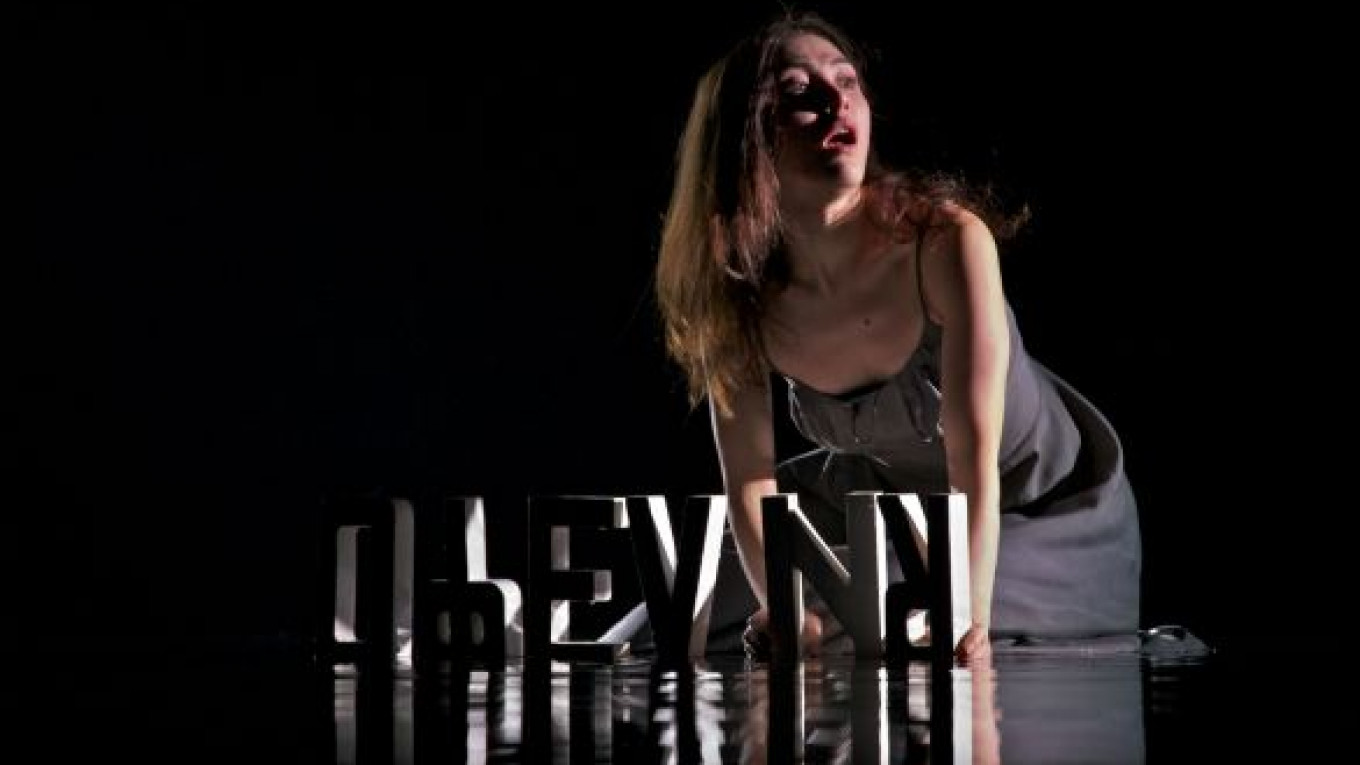"Hamlet" is one of the myths that we cannot do without. Directors dream of staging it. Actors dream of playing it. Audiences fill large halls to watch it, as is happening now at the Gogol Center where French director David Bobee has unveiled his second production of the play in three years — his first was with the Rictus Groupe in France in 2010.
Like few stories concocted over the centuries, "Hamlet" seems always to be contemporary.
A sensitive young man in troubled times has his future snatched away from him by an unscrupulous act, and he must decide how he will respond. And that's just the start. From there, you add encounters with duplicitous friends, corrupt figures of authority, a parent who doesn't understand, a lover whose affection is not enough to heal your despair and — here's the kicker — a revelatory, mystical moment when you are convinced that voices from the other side of death are speaking directly to you and giving you the inspiration you need to deal with this mess you are in.
Be honest. Spend a moment in front of a mirror and tell me you don't see at least some version of yourself, past or present, in that little narrative.
"Hamlet" is a big story and Bobee, who directed, designed and created the new adaptation of the text, has accordingly staged it big. He pretty much threw open the entire main stage at the Gogol Center, leaving actors alone in the middle of a large, cold space. Occasionally a rostrum or various tables are put in place, but the visual aspect of this show is usually a contrast of warm human bodies looking rather lost in dark, drafty spaces.
The cold atmosphere is established primarily by black tiled walls that give off a steely glint from the shadowy light provided by lighting designer Stephane Babi Aubert. It is enhanced significantly in the second half of the performance when the stage is flooded with water and the actors splash their way from one side of the stage to the other.
Bobee offers up several relatively simple changes to the canonical text that encourage us to see the play anew.
Even as spectators still file into the hall, the characters of the play come and go, paying respects to the body of Hamlet's father, who lies stiffly on a funeral bier. Later, silver panels on a wall are revealed to be sliding doors in a morgue where bodies can be deposited or retrieved. This serves in place of the graveyard in Shakespeare's original. Expect to see pistols in place of rapiers — and they often are aimed in the direction of the audience.
Several characters are reinterpreted and recast. There is, for example, just one gravedigger, played brilliantly by Alexander Gorchilin, and he is onstage from beginning to end. Hamlet's duplicitous old friend Rosencrantz (Alexandra Revenko) is played by a female, and she largely takes over the role of Guildenstern (Ivan Fominov) as well. Shakespeare's large group of visiting actors is limited to two (Vladislav Sanotsky and Svetlana Asanova), but they, like the Gravedigger, remain onstage until the end.
Filip Avdeyev plays Hamlet as a young man who, as Polonius suggests, loses his grip on sanity. The more he encounters lies, intrigue and evil, the more physically unhinged he becomes. He transforms into something of a whirling dervish, spinning, leaping and crashing about the stage until he comes to his senses — much too late. His break with his beloved Ophelia (Svetlana Mamresheva) is inevitable, painful and ruinous for both.
Artur Beschastny's throne-usurping Claudius is a man of obstinate self-control and pent-up passions, while Irina Vybornova's Gertrude is a strong, enigmatic woman who is able to maintain the facade of a co-conspirator to murder only for so long.
Polonius, unthinkingly corrupt and always loyal to power, is played by Alexei Devotchenko as a comic figure — a buffoon and a blabbermouth. His loaded banter with Hamlet makes for some of the evening's liveliest moments.
Bobee's interpretation of "Hamlet" is not so radical as to remake Shakespeare's play, but it does provide a fresh, intriguing take on the old tale.
Be forewarned: The performance runs 3 1/2 hours with no intermission. Even water aside, this is truly immersion "Hamlet."
"Hamlet" (Gamlet) plays Jan. 9 and 10 at 8 p.m. at the Gogol Center, located at 8 Ulitsa Kazakova. Metro Kurskaya. Tel. 499-262-9214. gogolcenter.com. Running time: 3 hours, 25 minutes.
Contact the author at jfreedman@imedia.ru
A Message from The Moscow Times:
Dear readers,
We are facing unprecedented challenges. Russia's Prosecutor General's Office has designated The Moscow Times as an "undesirable" organization, criminalizing our work and putting our staff at risk of prosecution. This follows our earlier unjust labeling as a "foreign agent."
These actions are direct attempts to silence independent journalism in Russia. The authorities claim our work "discredits the decisions of the Russian leadership." We see things differently: we strive to provide accurate, unbiased reporting on Russia.
We, the journalists of The Moscow Times, refuse to be silenced. But to continue our work, we need your help.
Your support, no matter how small, makes a world of difference. If you can, please support us monthly starting from just $2. It's quick to set up, and every contribution makes a significant impact.
By supporting The Moscow Times, you're defending open, independent journalism in the face of repression. Thank you for standing with us.
Remind me later.







